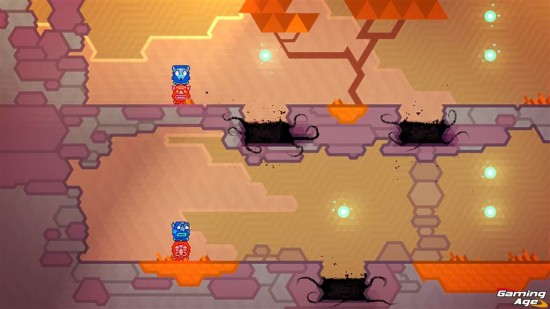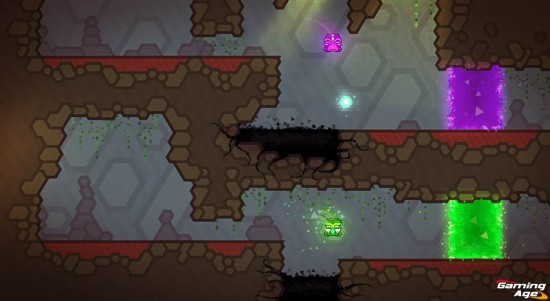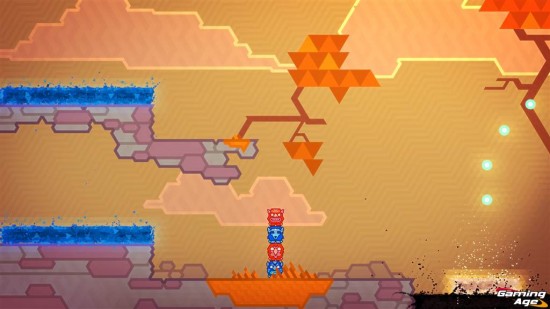Also On: PC
Publisher: Press Play
Developer: Press Play
Medium: Digital
Players: 1-2
Online: No
ESRB: E
I’d like to think that since I started writing for Gaming Age, I’ve developed a much better appreciation for harder games. I still tend to play everything I can on easy, but my favourite game last year was probably Rogue Legacy, and the year before that it was Hotline Miami, so I think that counts for some kind of progress, right?
Further evidence of this could be found in the fact that I really liked Kalimba. And, as a bonus, if I was looking for further evidence of how terrible I can be at hard games, I’d find it in Kalimba as well. In fact, it’s probably more evidence of the latter than the former, since I really, really suck at Kalimba.
Now, I maintain some of my suckitude is due to simple cheapness on the part of the game. I’d say at least a quarter of my deaths were due to something lethal grazing against one of my characters and killing me, even though previous close brushes didn’t do a thing. On top of that, while the game’s physics were mostly predictable, it did seem like there were moments where whipping characters back and forth didn’t go quite as smoothly as it should have. So as much as I sucked at Kalimba, I don’t think it can wholly be attributed to my glaring faults as a player. Primarily, sure, but not wholly.
Not that it makes a huge difference, of course; even taking out that cheap deaths, I still died dozens of times per level entirely because this is such a demanding game. But really, that’s the point of Kalimba. It’s a game in which you’re not just controlling two players, a la Brothers: A Tale of Two Sons, but controlling them with the same buttons. When one character moves forward, the other does too. When one jumps, the other does too. And when one dies, it’s back to the last checkpoint for the both of you.
That may sound straightforward, but Kalimba shows just how far it can be taken. The first few levels start out simply enough, with no glaringly hard spots. Then, just a few levels in, the difficulty level ramps up considerably, and it quickly becomes apparent that this is a lot more challenging than your typical platformer. You’re literally in two places at once, and you need to approach things from that mindset. It’s not enough that one of your characters is able to jump over that pit of death or go through that colour-coded wall; both of them have to be able to do it, and at the same time, too.
If that’s not hard enough, it doesn’t take long before the game starts working new mechanics in as well. Sometimes it reverses gravity on one character. Sometimes it uses cannons. Sometimes it uses trampolines. Basically, just when you start to think you have a sense of the game, it goes and makes things harder on you.
What’s really surprising about this is that Kalimba doesn’t look like your typical tough-as-nails platformer. It doesn’t look like some retro-obsessed pastiche, though its graphics are far from modern (it’s kind of pixelated, but not in a way that anyone else does it). It doesn’t revel in its toughness or try and psych you out, instead introducing you to everything in the game by way of a laidback bear who seems like he should be laying on a beach (or, at the very least, hawking kids cereals).
And yet…it’s still one of the toughest games to come out this year. Kalimba is hard, and it never tries to hide that fact. But I’m thinking that if even someone like me can enjoy the game, then it’ll be even more enjoyable if you’re made of even sterner (and, admittedly, more patient) stuff.




